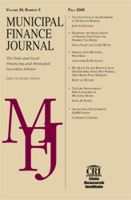Complete Issue MFJ 2001
Author: W. Bartley Hildreth.
Source: Volume 20, Number 01, Spring 1999 , pp.1-96(96)

< previous article |return to table of contents
Abstract:
A local government’s credit quality is affected by its ability to handle changing fiscal situations. Problems can range from inadequate fiscal management practices to external market events. This issue highlights two cases. Miami’s fiscal problems led the state of Florida to create a financial control board as a means of asserting fiscal discipline. Public administration professors Milan Dluhy and Howard A. Frank provide the latest installment in their coverage of the Miami workout effort. This case is instructive because it demonstrates the variety of actions required to restore a city’s finances to an acceptable level following years of neglect. Local government borrowers in emerging capital markets, such as the municipal bond market in Russia, are open to some of the same fiscal mistakes that have been made by American local governments, plus others that come with new securities in an evolving economy. An article on the Russian municipal market combines the expertise of American and Russian experts, namely public administration professor and seasoned municipal analyst William Simonsen and economics professor Maragrita Tchepournykh from Russia. They offer a profile of several troubled credits, illustrating the problems that can arise from borrowing to finance operating deficits. A continuing practice of many tax-exempt bond issuers is to sell competitively using the net interest cost (NIC) bid evaluation method. In contrast, a long line of research has pointed to the need to impose coupon constraints or to evaluate bids by the true interest cost (TIC) method, which takes into account the time value of money. Finance professor Earl D. Benson revisits the subject and reports new evidence, by state, showing that the NIC method continues to be very costly to municipalities, with the costs highest for those with the poorest coupon constraints. Existing debt, under certain conditions, can be refinanced to lock in lower interest rates even prior to the call date. This advance refunding procedure is constrained by arbitrage limits to prevent the investment of tax-exempt proceeds into higher earning taxable investments. Financial analyst William H. May uses an option valuation method to show the impact of negative arbitrage on refunding decisions. The complete issue also includes two regular features: Accounting professor Cathy Staples examines the latest developments from the Governmental Accounting Standards Board, as the board moves toward completion of its major changes in financial reporting standards for state and local governments. Tax analyst Paul Streckfus examines several new developments, including the IRS appeals procedure and other legislative and agency matters.Keywords: Miami fiscal crisis; municipal bond market in Russia; net interest cost method; negative arbitrage; unauthorized practice of law
Affiliations:
1: Wichita State University.